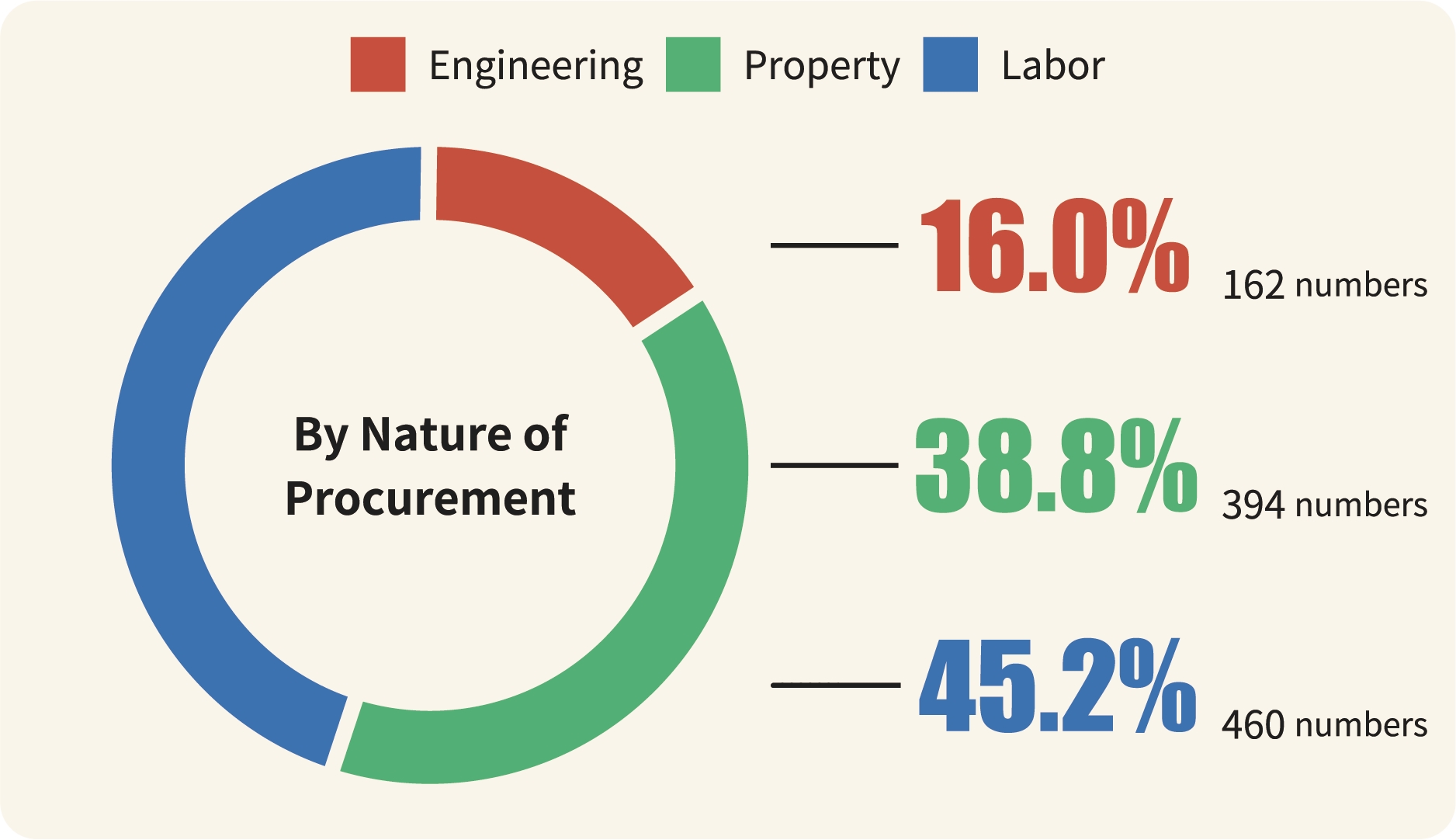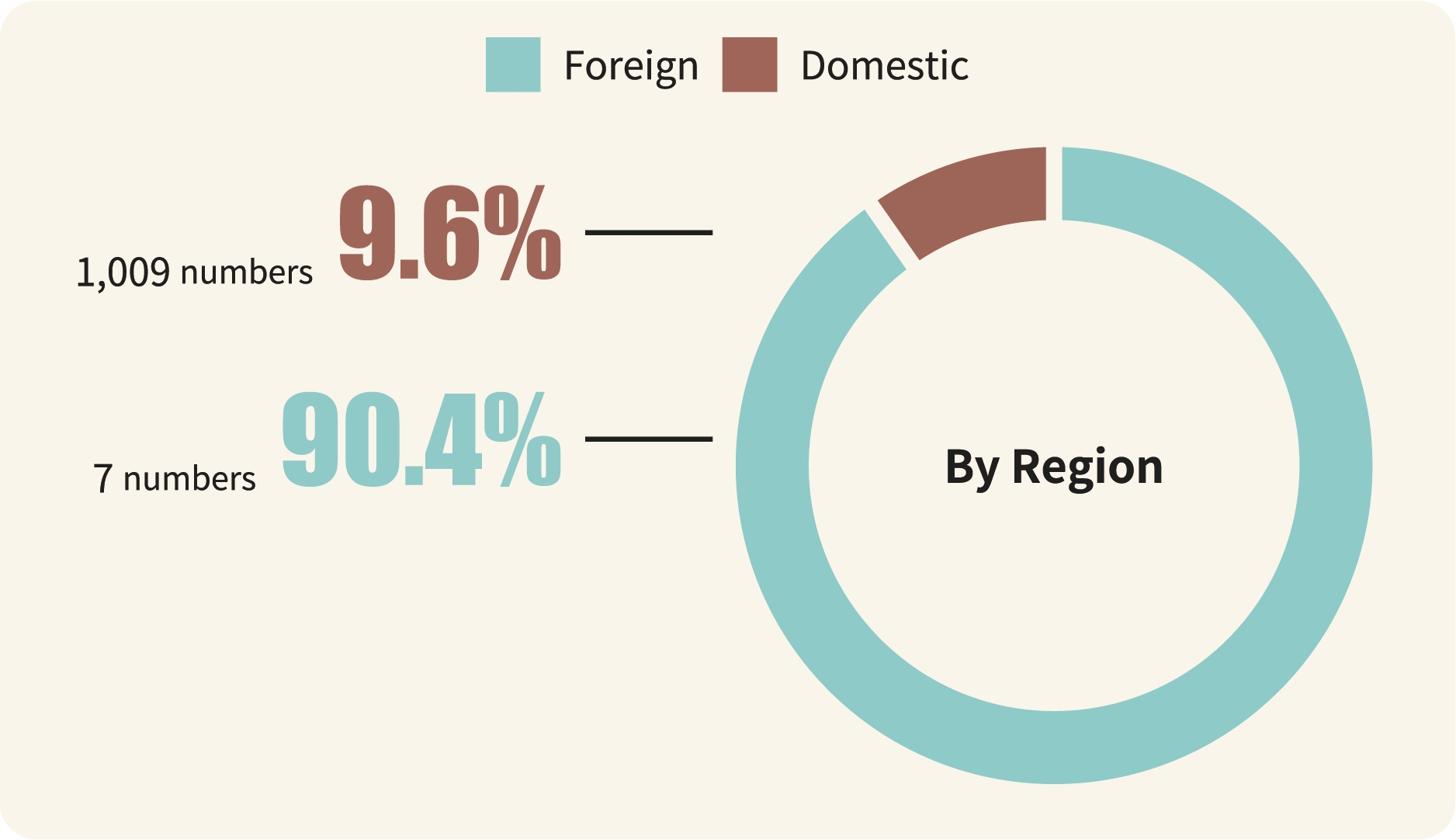The selection of suppliers follows the prescriptions of the Government Procurement Act. In addition, it is clearly stated in all relevant bidding documents that new suppliers shall comply with the principles of fair trade, environmental protection regulations, Labor Standards Act, and Occupational Safety and Health Act. Due to the complexity of human rights assessment mechanism, TSC currently screens the suppliers based on the self assessment of the human rights compliance prescribed in the procurement agreement by the suppliers before signing. In 2023, the percentage of new suppliers meeting the selection criteria reached 100%. To work in line with the implementation of green procurement promotion plan approved by the Executive Yuan, TSC purchases ecofriendly and green products. The green procurement ratio in 2023 was 98.50%.
Moreover, to support domestic industries, priority is given to the sources of goods manufactured or services provided by domestic suppliers. At present, apart from the 86.5% of bulk grain raw materials in the Livestock Business and sugar raw materials in the Sugar Business that are imported from abroad, domestic suppliers are prioritized for the supply of the remaining raw materials.
Procurement Overview
All the procurement of TSC must comply with the relevant provisions of the Government Procurement Act in order to achieve justice, openness and fairness, and the results have been good. The internal control system set up the Key Points for Financial and Labor Procurement Operations, Key Points for Bulk Grain Purchase, Operating Points of Project Purchase and Performance Management, and Operating Points of Public Selection of Technical Service and Labor Procurement. TSC has set up an outsourcing center as a dedicated unit in charge of purchasing and organizes doubts, objections, complaints and consulting related to the Government Procurement Act so as to complete the procurement system and increase procurement efficiency. New suppliers and existing suppliers should all meet the requirements of the Procurement Act.
In 2023, the total purchase amount (based on the contract amount) was NTD 7,062.5 million. Among this, the purchase amount of bulk grain purchase was NTD 935.9 million, and for raw sugar, it was NTD 5,448.5 million. The amount of foreign purchases accounted for approximately 90.4% of the total purchase and the domestic purchases accounted for 9.6% of the total purchase.
- Supplier Profiles in 2023( By the Nature of Procurement )
| Categories | Numbers | Percentage |
|---|---|---|
| Engineering | 162 | 16.0% |
| Property | 394 | 38.8% |
| Labor | 460 | 45.2% |
| Total | 1,556 | 100% |
- Supplier Profiles in 2023( By Domestic and Foreign Suppliers )
| Categories | Numbers | Percentage |
|---|---|---|
| Foreign(Including Japan and the United States) | 7 | 90.4% |
| Domestic | 1,009 | 9.6% |
| Total | 1,016 | 100% |
Usage of Raw Materials
The main raw materials imported in 2023 include raw sugar, corn and soybeans. No recycled raw materials were used as the raw materials for the production of food products. TSC’s new product packaging design is in line with the MOENV’s regulations on the restriction against excessive packaging of products to reduce both the amount of packaging materials used and the generation of waste as well as the environmental load.
| Items | Usage Amount in 2023 | Country of Origin | Renewable Raw Materials/ Non-renewable Raw Materials | Usage of Recycled Raw Materials |
|---|---|---|---|---|
| Sugarcane | 478,251 tonnes | Taiwan 100% | Renewable raw materials | None |
| Imported Cane Sugar | 253,000 tonnes | Thailand 27.67% Honduras/ Guatemala 13.83% Guatemala 15.02% Brazil 28.46% Australia 15.02% | Renewable raw materials | None |
| Corn | 79,252 tonnes | U.S. 33.93% Brazil 49.11% South Africa 3.46% Taiwan 13.50% | Renewable raw materials | None |
| Soybeans | 40,000 tonnes | U.S. 100% | Renewable raw materials | None |
| Meat | 1,073.49 tonnes | Taiwan 100% | Renewable raw materials | None |
| Oil Products (gasoline and diesel) | 289,564 tonnes | Taiwan 100% | Non-renewable raw materials | None |





